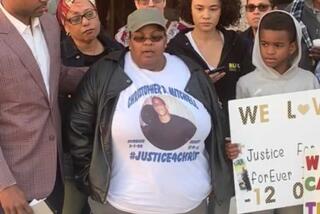Jury Told Tuffree Did Not Intend to Kill Officer
- Share via
In a scathing counterattack to the prosecution’s closing statements, Daniel Allen Tuffree’s defense attorney told jurors Tuesday that the former schoolteacher was not an outlaw who intended to kill a Simi Valley police officer.
To the contrary, Deputy Public Defender Howard Asher said in his closing remarks, Tuffree was an anxious and troubled man who hid from police when they came to his house last year, and he shot Officer Michael Clark to death only after the policeman fired at him.
“Dan Tuffree never intended to hurt anyone,” Asher said. “He only wanted them to leave.”
Tuffree, 49, is charged with first-degree murder--and faces a possible death sentence--for the shooting death of Clark.
He is also charged with attempted murder and armed assault for firing at Officer Michael Pierce, one of three policemen sent to Tuffree’s house last year after reports that the former high school teacher had been taking Valium and drinking alcohol and was possibly suicidal.
On Monday, Deputy Dist. Atty. Patricia Murphy told jurors that Tuffree was hostile toward police and grabbed his gun when he saw officers entering his backyard.
During their confrontation at the kitchen window, Murphy said, Tuffree stalked Clark “like a wild animal,” shooting the officer as many as five times with a high-powered gun and bullets designed to inflict fatal injuries.
But during his five-hour summation Tuesday, Asher presented a different interpretation of the evidence in the case--and a contrasting image of the gray-haired defendant, who sat motionless during his attorney’s arguments.
Asher acknowledged that Tuffree made a “big mistake” when he pulled a .40-caliber semiautomatic pistol out of his gym bag and placed it on his kitchen counter in hopes of scaring police away from his home.
But he insisted that the evidence fails to support prosecutors’ claims that Tuffree premeditated his attack on Clark.
“He is not guilty of murder because he didn’t intend to hurt Michael Clark,” Asher said, urging the jury to return a lesser verdict of manslaughter.
*
Asher refuted the testimony of police experts who described the gun battle as an ambush, telling jurors that such emotionally charged words were a “cheap trick” employed by prosecutors to win the case.
“What we are dealing with is a schoolteacher with anxiety problems,” Asher said, “ . . . not a commando.”
Tuffree’s intent that hot August day last year was to escape his emotional troubles by drinking wine, taking anti-anxiety pills and listening to classical music, Asher said.
He had secreted himself in his home, Asher said, and wanted nothing more than to “check out for a bit.”
Police were called to Tuffree’s home after his insurance company, which had received calls from him requesting more Valium, telephoned mental-health workers, who then notified the police.
Tuffree initially tried to hide when officers arrived. When Clark yelled to him, Tuffree ordered police to leave. After Clark demanded to see Tuffree’s hands, he placed his gun on the kitchen counter.
*
These acts, Asher argued, do not constitute a deliberate, coldblooded murder.
“Is that what you do when trying to kill someone? Ask them to leave?” Asher said.
“If Dan Tuffree wanted to shoot a police officer, he would have had ample opportunity,” he said. “The fact that he didn’t speaks volumes about his intent.”
Asher contradicted the prosecution’s assertion that Tuffree’s deep-seated hatred for police was a motive for the killing.
“When he is angry, he writes a letter to his senator--he doesn’t drive by the Simi Valley Police Department with a gun,” Asher said.
Throughout the day, Asher hammered at two key points he said prosecutors failed to prove beyond a reasonable doubt: who fired first and whether Tuffree committed premeditated murder.
“If you are not convinced beyond a reasonable doubt of these two very critical facts,” Asher said, “the law makes it very simple for you.”
In arguing for a lesser, voluntary manslaughter charge, Asher told the jury to question the testimony of numerous law enforcement officials, because police tend to protect one another.
He specifically targeted the testimony of Pierce, whose statements were refuted by three other witnesses and physical evidence in the case.
“Would they ever consider suggesting that his [Clark’s] actions were improper?” Asher asked before a packed courtroom audience, which included Simi Valley Police Chief Randy Adams.
“I am not saying this for one moment to sully the memory of Michael Clark,” Asher said.
Wrapping up his lengthy summation, the attorney again raised the issue of whether officers should have stayed at Tuffree’s house after he asked them to leave. The issue, he said, comes down to how the duties of police officers are to be balanced with the public’s fundamental rights to privacy.
“There are a lot of people out there in our society today who have trouble dealing with their lives,” Asher said. “Mr. Tuffree’s right to be left alone . . . was ignored.”
More to Read
Sign up for Essential California
The most important California stories and recommendations in your inbox every morning.
You may occasionally receive promotional content from the Los Angeles Times.













